|
The Great War
News Reports From the Front
100 Years Ago This Month
January 1917
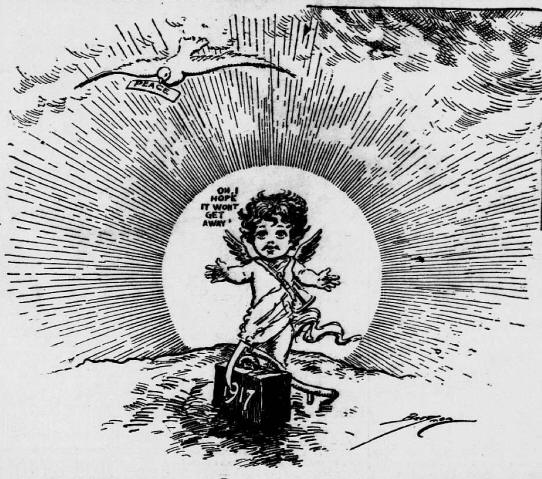
As the New Year rolled in, the people of Europe held their breath that the three years of carnage would come to an end. Sadly, the terms proposed by the Allies ended all talk of peace and the war would drag on. As history would later record, the Allies would, in the end, get their terms, but in doing
so, they laid the foundation for a much more bloody and devastating World War II.
January 5
The British and French soldiers welcomed the arrival of 1917 on the Western front as the beginning of the end of the great world war. There may be varying views and theories as to how this is to be brought about, but there is no question that throughout the British Army there is a conviction that the next 12 months will bring
a victorious peace to the allies.
Opinion among the British and French fighters as to how the war will end is divided into two schools. One believes that Germany will be willing to grant extreme concessions and the other believes only military pressure will bring them the fruits of victory. Both schools, however, agree that this is a decisive year.
On the British front, the New Year made its bow with little ceremony. However, there is one section where the British artillery followed a practice adopted last year of welcoming January 1 with salvos from guns of all calipers. Along this front everything from machine guns to the biggest of the heavies joined in firing first
one round, then nine, and one, and finally seven. "We do not know whether the Germans recognized it or not, but we will try them again tonight," said an artillery captain.
In sending this fire to the Germans there was a further complication of differences of time, the Germans observing continental time, which is one hour ahead of the British and French clocks. To avoid all doubt, the British artillery fired salvos at both 11 o'clock and midnight.
Low black clouds scudded over the battle area the last night of the old year, and his successor was born on a howling wind, which caught up and carried away the thunder of the guns. The grim booming was swept far beyond the battle line until it mingled with the church bells summoning the people to prayer in the war bound
villages of France.
Confidence in the effect of Germany’s submarine campaign has been expressed openly in German naval circles. In a review of the naval war it is said: "we firmly believe that the commercial shipping of our enemies will become still less active in 1917. This will be accompanied by our daily growing submarine weapon. Our
confidence for the New Year is based on the expectation that our submarines will continue with growing success of the process of wearing away the economic life of our enemies."
Reflecting on Russia's four great mass attacks in 1916, one German military critic said they had no more success than did the great Anglo-French offensive on the Somme on the Western front.
"The March offensive of the Russians in the region north of the Prinet marshes was stifled after lasting a fortnight. Russian casualties numbered 100,000. The second offensive on the Carpathian front, begun early in June as part of the general Allied offensive, resulted in the forces of the Central Powers being pushed back
only 18 miles before the offensive came to a standstill following the sacrifice of more than one million men.
The third offensive in September was launched by the Russians in conjunction with a Romanian attack against Transylvania. It was rapidly and gracefully terminated by counterattacks of the Germans. The last Russian offensive of 2016, an extraordinarily violent one in the wooded Carpathians and on the frontier Mountains of
Moldavia, began November 28, could not prevent the annihilation of the Romanian army. As 1916 drew to a close, the Central Powers had once again taken the offensive against the Russians.
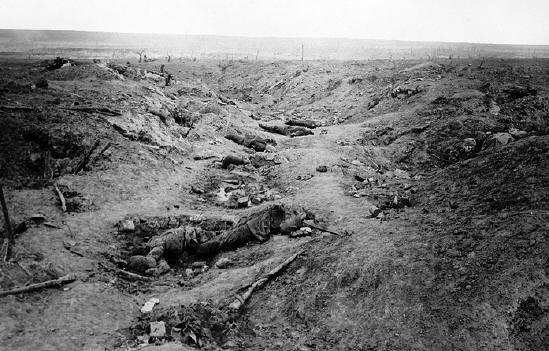
Russian dead on the Sereth line
The long and stubborn retreat of the Russians to the Sereth line, 50 miles of fortifications, is virtually ended and the Russians are expected to make a stand behind it. While the Russians and Romanians still hold Braila, maintaining their grip on the bridgehead, which defends their last foothold in Central Romania,
their bridgehead at Matchia, has been reduced by successful German attacks.
The Germans and Bulgarians are now in a position to push their guns within eight miles of Braila, and it is assumed that if the invaders capture the latter town the Russian line west of the Danube will be withdrawn. It is taken for granted that the prolonged resistance to the German advance has enabled the defenders to remove
the stores of grain and other materials from Braila, an important Danube port which houses a storehouse for grain and oil supplies of considerable magnitude.
January 12
With the capture of Braila on Monday, the battle for the possession of the Southern bank of the lower Sereth River, in central Romania, has been decided in favor of the Central Powers. German troops took just one month in forcing their way from Bucharest to Braila; a distance of 125 miles.
The Braila bridgehead, while not itself an integral part of the Sereth line, weakens the eastern flank of the Sereth position. It is not only here, however, that the Sereth line is threatened, for despite a tenacious defense by the Russians and Romanians, the line northwestward beyond the Buzeu River is not holding up well
against German pressure, while the effort to keep the Germans in check in the Moldavian frontier valleys is apparently proving still less successful.
A break in the line on the southerly front would imperil the Moldavian frontier position. Commentators in allied capitals are considering the possibility of the Russians being compelled to abandon the line of the Sereth and withdrawal to the Russian frontier, or beyond it.
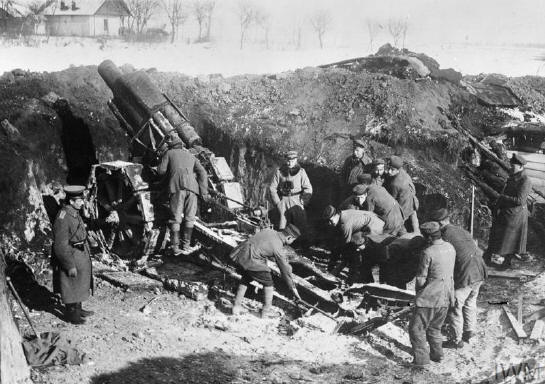
A German heavy artillery gun in action on the Romanian front. By this stage of the war, the Germans had perfected the process of "softening up" enemy positions before attacking them with infantry. Artillery was made more effective because of the rapidness of the Romanian collapse, limiting the time
Romanian troops had to fortify new defense lines.
One point favoring the Russians in their defense is the communication routes they now command. Behind the advancing Germans, the railway lines have thinned out, but in the rear of the Russian position the network of roads over which men and supplies may be brought to the front is vast.
The London Times pays tribute to the great efforts of Russia put forth on Romania's behalf. Saying: "Her attempts to hold the Sereth line has failed, as the attempts to say Bucharest failed: but she has delayed the Germans for weeks and made them pay a heavy price for their successes. The main brunt of the recent offensive has
fallen on Russia, for the bulk of the Romanian army has been withdrawn behind Russian lines to be resupplied and reorganize. Russia could hardly have hoped to do more than delay the German advance. With both its extremities now in the enemy's hands, the Sereth defensive line is now useless. No doubt the Russians are on their way from this point to
the next defensive position - the river Sereth itself. Behind that line again is the river line of the Pruth."
Meanwhile, Berlin dispatchers say that workers who are repairing the damage in the Romanian oil district have advanced so far that some work may resume production within a few weeks. About 2,000 carloads of petroleum and immense warehouses of goods are said to have been captured at Campina.
On the Western Front, through rains, mist, fog and deep mud, the British Army is continuing day-by-day to pound the German lines. Although there has been no distinctly spectacular action recently, daily and nightly trench raids and the drumming of the artillery has continued. According to the stories told by the prisoners, the
British tactics have aroused the German troops almost beyond endurance.
Operations on Tuesday morning drove the Germans from a position that they had held for some time and from which they could observe part of the British line. The attack was preceded by the usual artillery preparation. Just before dawn the British went over, ahead of them. In that darkest hour before the sunrise, was the fiery
curtain of shells from the guns far in the rear. The sodden stretch of no man's land, over which they plotted, was lit by the glare of the exploding shells, as the barrage crept steadily forward the men followed it so closely that one expected them to be smashed by the fire of their own guns. Red rockets from the German trenches flashed signals for
aid to the defending guns in the rear, but the counter barrage failed to check the advance. The German gunnery in this instance was described by the attacking officers as weak and erratic.
The British soldiers encountered little resistance when they entered the shell torn trenches. The Germans had taken refuge from the terrific shellfire in the dugouts in communication trenches. The prisoners taken in this raid had been on the front line for a long while and appeared very much dejected. As soon as the captured
trenches had been cleared of the last hostile troops, squadrons of engineers were sent to consolidate and repair the new positions, and before night the regular booming of the big guns told that the battle had once more settled down into its customary routine.
January 19
Yesterday, the Allied powers formally responded to the Presidents’ request for peace terms, which included the restoration of Belgium, Serbia and Montenegro, and repartitions for the damage they sustained, as well as the evacuation of France, Russia and Romania and reparations as is considered just. The Allies also require the
liberation of Italians, Slavs, Romanians and Czechs for foreign domination, as well as the retirement of the Turkish Empire from Europe.
It is generally agreed everywhere that the nature of the terms of the allies are unacceptable to the Central Powers, making an early peace unlikely.
The following proclamation by the Emperor to the German people has been officially published in Berlin in response to the Allies’ response to the President’s peace note: "Our enemies have dropped the mask. After hypocritical words of love of peace and humility, they have now, in the reply to the United States, admitted their
lust for conquest. Their aim is the crushing of Germany, the dismemberment of the powers allied with us, and the enslavement of the freedom of Europe and the seas."
"But for what they cannot achieve in 30 months of the bloodiest fighting and unscrupulous economic war they will also fail to accomplish in the future. Burning indignation and holy wrath will redouble the strength of every German man and woman, whether it is devoted to fighting or to working in the factories. We are ready for
all sacrifices. The God who planted his glorious spirit of freedom in the hearts of our brave people will also give us and our loyal allies, the full victory over all the enemies’ lust for power and rage for destruction."
The possible inauguration of a ruthless submarine warfare in consequence of the attitude of the allies, with a view of bringing England to terms, is much discussed in the various newspapers of Europe.
While it is true that submarines have not been the success expected, the feverish building of submarine parts in various manufacturing towns in Germany seems to indicate that the German government is of the general opinion that the submarine can snatch victory out of the present gloom. The point of view of the German
government is that the war is settling down to a starvation match between Germany and her enemies and that the submarine may place Germany in a position to dictate terms.
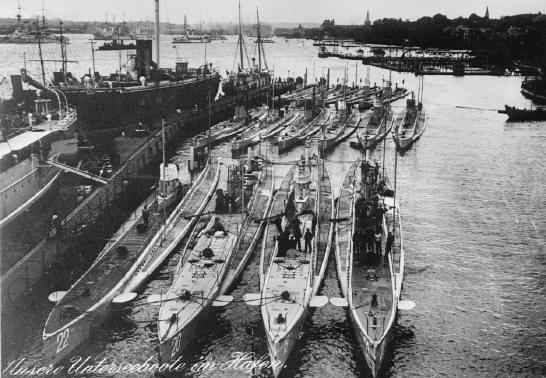
With the Allied rejection of the Central Powers’ peace terms, the Germans renewed
their efforts to bring England to her knees through submarine warfare. A new generation
of U-boats, far bigger and faster than the old U-boats, allowed Germany to attack
Allied shipping everywhere in the Atlantic.
Editorial comments on the Allied response to President Wilson’s request for peace terms was overly negative in neutral overseas news agencies:
The Handelebiad of Amsterdam says: "The course of action of the Allies means that everything is turned upside down. The plan to make the Central Powers almost helpless and then to talk about fraternal feelings, international law and the principle of nationalities, is not conducive to lasting peace. Are the conditions regarding
evacuation of occupied territories to be applied only against the Central Powers?"
The Stockholm Gazette says: "The application of the principle of nationality as outlined by the Allies is rather one-sided, and adds, as to the plan to expel Turkey from Europe, we fail to see why this is more to the interest of civilization now then it was a few years ago, when Great Britain was guaranteeing the integrity of
that country."
The Tagwacht, a socialist paper of Bern, Switzerland, says: "The demand for expulsion of the Turks from Europe proves that the Allies’ desire to confuse public opinion, since it speaks of the principle of nationality, and at the same time of suppressing the entire nation nearly because that nation decided to side with the
Central Powers. If Greece is an excellent illustration, other hypocrisy practiced by the Allies in regard to its true ideas of liberty of nations, then this demand in regard to Turkey crowns all their plans."
Announcements that a British and two French vessels had been sunk in the Atlantic and two British steamships captured by a German raider confirm reports, which have been in circulation for some time, that a German raider had once more penetrated the screen of Allied warships, and escaped to the open seas.
For some time, it has been assumed that a German raider had sunk the British and French merchant ships, which had long been overdue. Most of these boats were last reported in the South Atlantic, indicating that the German raider has been at work off the South American coast.
A cordon of British cruisers, reported to number 15, is believed to be sweeping the South Seas in search of the raider. Steamship circles were especially concerned today over wireless warnings that the German raider was working northward to more frequented lanes of steamship travel. The possibility that the raider may have
armed and manned one or more of her captured prizes and dispatched them also on commerce prying missions, was another source of anxiety.
While nothing is definitively known as to the identity of the raider, two hypotheses have been constructed from the details supplied by the crews of the sunken ships. One of these is that the vessel is the German auxiliary cruiser Vineta, but the one most generally held is that the raider is the Moewe. However, every detail in
regard to the ship's construction seems to fit the latter supposition.
According to reports from authoritative sources, the Moewe is understood to have sailed from Kiel under the Danish flag, carrying a cargo of hay on her bridge in order to conceal her armament. When last seen, the Moewe was painted black with white markings. Her armor includes four torpedo tubes in service and several tubes in
reserve. She is believed to be carrying mine laying apparatus. The raider also carries a large number of auxiliary plates, which could permit her commander to change the appearance of the bridge at will. In addition she is reported to have a collapsible funnel.
The fall of Premier Trepoff of Russia, known for his liberal views, is said by the overseas news agency to have been the decision of Emperor Nicholas to take a decided stand against radical elements. Following the assassination of the monk, Gregory Rasputin. The Premier’s ministers hastened to the Emperor's headquarters and
protested their sacking, but to no avail. The power behind the throne is now Protopopoff, who is best characterized by a saying of his which is known all over Russia: "The Duma will keep quiet as soon as it gets a beating, and the people will soon learn quite clearly that no one challenges the will of the Czar!"
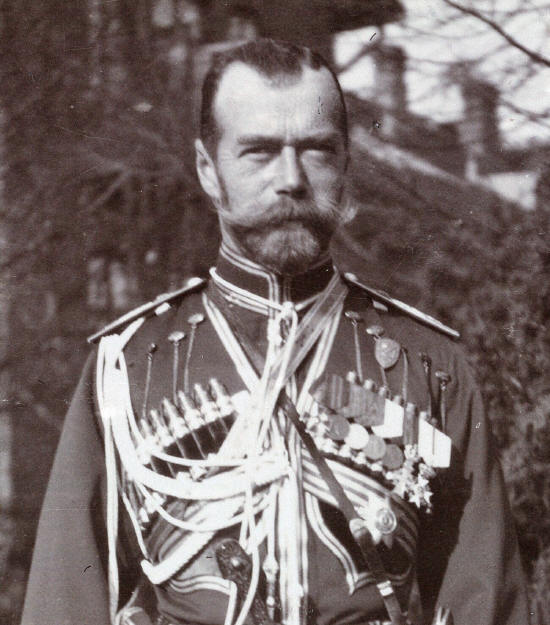
Little did he know, that less than two months after his demand for absolute obedience from his people, Nicholas II would be forced into abdication. Nicholas II would be the last Emperor of Russia, ruling from November 1st, 1894 until March 15th, 1917.
January 26
The Rio Janeiro papers assert that the German raider is accompanied by three small submarines. The submarines are said to be 6 meters in length and of an entirely new type. Members of the crews of the ships sunk by the raider are quoted as saying that the submarines constantly leave the mothership and reappear after short
intervals, apparently doing scouting duty.
According to press dispatches, a strange steamship with four smokestacks painted black has been cited off Ceara, Brazil, running at high speed. The German raider is reported to be equipped with collapsible smoke stacks, the number of stacks visible being changed at intervals to disguise the identity of the vessel.
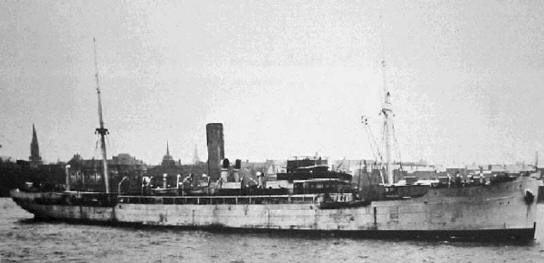
The SMS Möwe was a merchant raider of the Imperial German Navy which operated against
Allied ships during World War I. Disguised as a neutral cargo ship to enable it to get close to targets, the Möwe was effective at commerce raiding, ending up as the most successful
German raider in either the first or second World Wars, sinking 38 Allied ships.
Unlike her victims, she survived the war.
British authorities have issued a warning to shipping companies that the captured British steamer St. Theodore has been converted into a German commerce raider and is cruising along the leading steamship routes. Secret instructions have been given to the companies regarding routes to be followed.
Meanwhile, Allied war vessels, aside from hunting down an active raiding squadron, are keeping close watch on several merchant vessels suspected of supplying the Moewe and her allies with food and of assisting them in other ways. As a precaution against the illegal use of Brazilian territory as a base of operations for the
German ships, a portion of the Brazilian Navy is maneuvering off the coast.
From Rio de Janeiro it is reported that the Caproca and another German vessel, interned at this port, have made preparations to put to sea. It is believed that these vessels are endeavoring to make their escape for the purpose of reinforcing the raiders, which are suffering from a shortage of supplies and are depending on the
flight of German ships from Brazil.
At Santa Clara, the Danish steamer Hammershus was fired while trying to put to sea secretly after receiving a quantity of provisions and according to a report, a large quantity of explosives from the German ships anchored in the harbor. The Hammershus entered the port at 10 o'clock on Wednesday night and dropped anchor close
to the German ships. The movement of the ship was observed from the fort, which signaled her to stop. The signals were ignored until two cannon shots were fired, forcing the ship to halt where she was boarded by the port police, who forced the steamer to anchor in the neighborhood of Brazilian warships that were ordered to keep it under surveillance.
The crew of the British steamer Dramatist, which was destroyed by the German commerce raider, said that they sighted the raider when it was 7 miles distance. The Germans rapidly closed in and went alongside and hoisted the German naval ensign and signaled the British to stop. Immediately afterwards, trapdoors under the
bulwarks of the raider’s forecastle dropped, revealing guns of about 2 1/2 inches in caliber. A boatload of armed Germans boarded the British ship and the steamer was sunk by explosives.
The men of the Dramatist say that the raider appears like an ordinary cargo steamer and when passing neutral ships hoist the British colors, but fly the German flag when it cites a British ship.
Meanwhile, a German submarine in the English Channel sighted a steamer and signaled her to stop. The steamer carried a Danish flag. The submarine commander, considering the steamer harmless, approached her on the surface. Suddenly, the steamer raised the British flag and let fall a section of the siding on her bow, revealing
two guns of 10 to 15 cm, and commenced firing. The submarine succeeded in submerging and escaping.
Read past editions of News Reports From the Front
Have a newspaper clipping on a event that took place in Emmitsburg?
If so, send it to us at history@emmitsburg.net
|